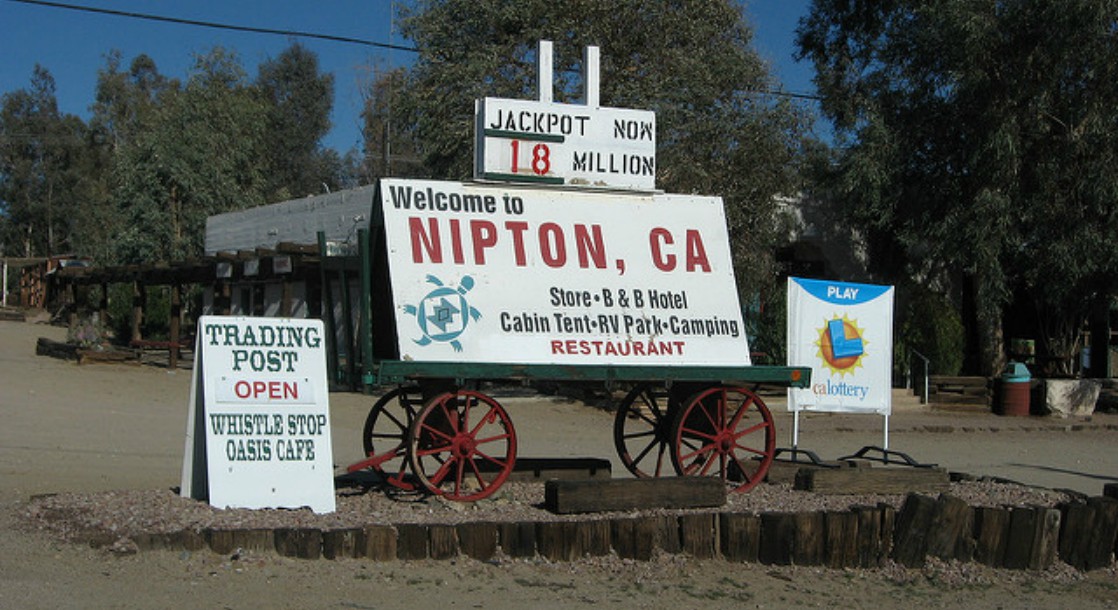Lead photo via Flickr user Ken Lund
After decades of economic toil under the desert sun, the town of Nipton on the edge of California’s Mojave Desert is ready for a facelift, and it's all thanks to legal weed. Earlier this year, Arizona-based American Green — the largest publicly traded cannabis company in the United States — purchased the entire town, with plans to turn Nipton into America’s first and largest cannabis-themed resort destination. As more information trickles out and the Nipton remodel comes into focus, some California environmentalists are worried that the built-from-scratch tourist business could exacerbate the desert region's already pressing public water problems.
According to an in-depth report from News Deeply, American Green will rely on Nipton’s groundwater to not only construct a fully-functioning town and cannabis cultivation operation, but also an infused bottled water business. To irrigate their crops, satiate the thirst of their guests, and fill bottles with CBD-infused water, the well-funded ganjapreneurs will be pulling from an ancient aquifer beneath the town.
While American Green representatives are confident that the 420-friendly resort will go off without a hitch, the green rush prospectors could run into trouble with California’s recently enacted Sustainable Groundwater Management protocol that “requires groundwater-dependent regions to halt overdraft and bring basins into balanced levels of pumping and recharge.” In other words, California groundwater users must now prove to the state that they are not irreversibly damaging local aquifer levels — a possible problem for the perma-dry desert town.
“It’s a non-renewable resource within the timeframes that we manage groundwater on,” said John Izbicki, a research hydrologist with the U.S. Geological Survey, to News Deeply. “Recharge from precipitation out in the desert is effectively zero, because of the high amounts of evaporation.”
Still, American Green plans to go forward with their ambitious plan, with a press release sent to MERRY JANE last month claiming that “plans for Nipton include setting the standard for energy efficiency and environmentally responsible tourism” using solar and “green” power sources to fuel the resort. As for water, David Gwyther, chairman and president of American Green, is confident that the local groundwater aquifer will suffice.
“We have access to a very large aquifer, and we’ll be using it accordingly,” Gwyther told News Deeply. “If it’s 32 million gallons, and if we take a million or two, it won’t be noticed.”
If you listen to the experts though, that reasoning might not be entirely sound. Because rain rarely lasts long enough to properly soak into Nipton’s desolate soil, geologists estimate that the future ganja town’s water was deposited over 12,000 years ago, with little natural replenishment currently taking place.
“Really, it just comes down to what’s the annual recharge in the basin, and what’s the demand,” said Eric Garner, a Los Angeles attorney and expert on groundwater law, to News Deeply. “I think it’s fine for there to be a net loss for the basin for a year or two – like during a drought – so long as it’s within the sustainable yield and the annual recharge covers it. What’s a problem is a long-term, chronic decline.”
In addition to the possible water strain, local officials are worried about the harsh realities American Green might run into in their attempt to build a series of massive infrastructure projects on land that’s mostly been home to mirages.
“Given the attention being paid to legalization, and the novelty of the idea, this may attract a whole lot of people all at once. That does bring with it some concerns about infrastructure, sanitation and things like that,” said Chris Clarke, California desert program manager at the National Parks Conservation Association to News Deeply. “It may not be the best place for a very large commercial enterprise unless that commercial enterprise has figured out really creative ways of doing without a whole lot of water.”
Given California’s large-scale concerns about the state’s public water supply as well as the continued environmental impact of cannabis cultivation, Nipton’s progress could highlight some of the Green Rush’s most intractable problems.
Follow Zach Harris on Twitter











